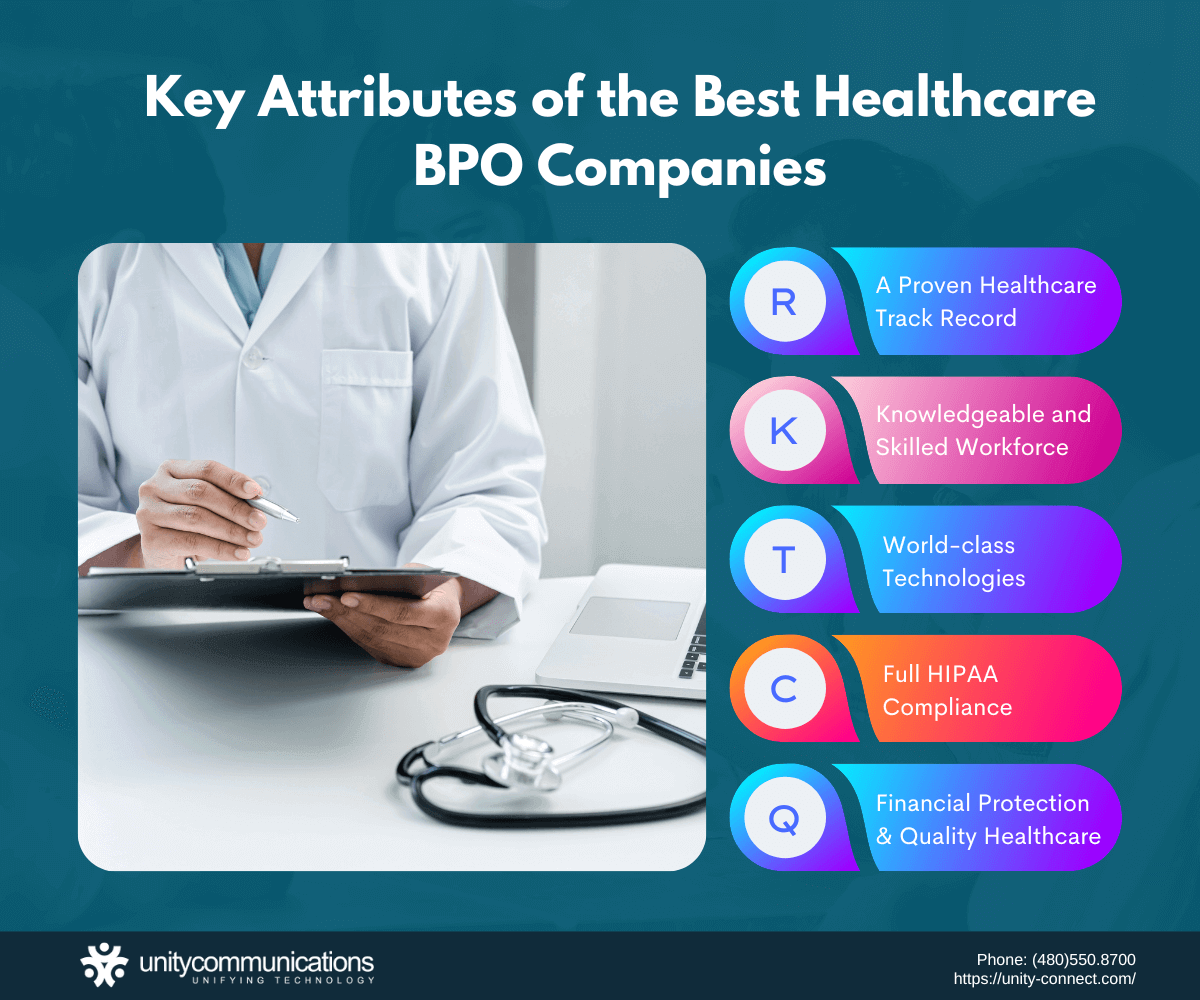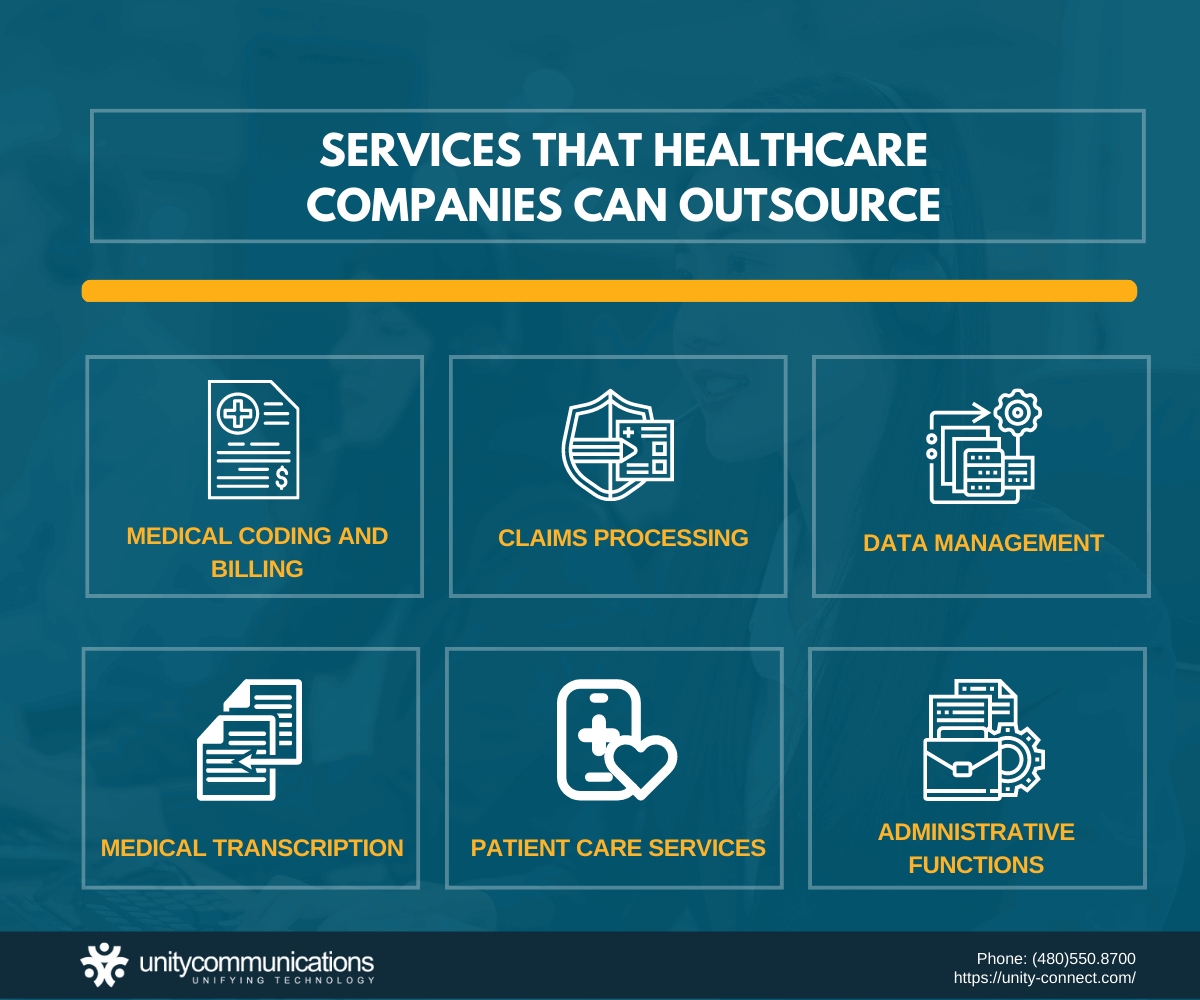IN THIS ARTICLE
Table of Contents
Healthcare is vital for saving lives, treating patients, and promoting public well-being. However, as a healthcare provider, you continue to face the impact of the Covid-19 pandemic. You also face the need to reduce your operating costs while still providing quality healthcare.
So how do you meet these needs? Healthcare BPO is the answer.
Find out what the best healthcare BPO companies offer. Learn more about their attributes, outsourcing services, and key benefits.
What Is Healthcare BPO?
Healthcare BPO stands for healthcare business process outsourcing. It entails hiring a third-party service provider to handle medical or non-medical operations.
Healthcare providers include doctor’s offices, clinics, hospitals, and even nursing homes. Using healthcare BPO, they entrust clinical and non-clinical tasks to external vendors. They mainly seek to reduce operating costs, allow employees to focus on patient care, and provide more benefits for patients and clients.
On the flip side, healthcare BPO companies offer different outsourcing services. The most common ones are medical billing, claims processing, and data management. These service providers go as far as optimizing your healthcare operations.
What Makes the Best Healthcare BPO Company?

The best healthcare third-party service provider helps you succeed at your job: providing patient care. Its ultimate goal is to free up your time and help you focus on treating patients.
With its expert workforce and advanced technology, it optimizes your healthcare operations. But how it does that is not simple.
Below are the key attributes of the best healthcare BPO companies.
1. A Proven Healthcare Track Record
The BPO sector has boomed in recent years, catering to various industries. The best healthcare BPO vendor has a proven track record in the healthcare industry. It has experience and expertise in handling clinical and non-clinical functions. If you’re looking for a BPO partner, choose one specializing in healthcare.
2. A Knowledgeable and Skilled Workforce
A healthcare BPO workforce doesn’t necessarily consist of health professionals (doctors and nurses). However, its agents must be knowledgeable and skilled in the medical field. Why? They assume critical roles, such as medical billers, claims processors, and data entry specialists. In the end, the best healthcare BPO partner has a solid workforce.
3. World-class Technologies
Due to a lack of resources, many industries outsource to leverage the latest technology. These include robotic process automation (RPA), cloud computing, and artificial intelligence (AI). The healthcare sector is no exception. The best healthcare BPO companies have advanced technological resources. They allow medical institutions to capitalize on these.
4. Full HIPAA Compliance
HIPAA stands for Health Insurance Portability and Accountability Act of 1996. It’s a federal law that applies to all healthcare institutions in the United States. It aims to protect sensitive health information from being disclosed without the patient’s consent. The finest healthcare BPO partners are fully compliant with the HIPAA guidelines.
5. Financial Protection and Quality Healthcare
The World Health Organization (WHO) recently cited the Sustainable Development Goals (SDG). SDG underscores quality as a critical element of universal health coverage (UHC). It asks different countries to achieve UHC, including financial protection and quality healthcare. The best healthcare BPO partner aligns itself with these global health goals.
What Services Do Healthcare BPO Companies Offer?

Healthcare BPO companies have a vast scope of outsourcing services. They cover clinical functions such as patient care at a minimum. But they focus more on back-office operations, whether administrative or patient support.
Let’s look at the common outsourcing services they offer.
Medical Coding and Billing
Most healthcare institutions entrust medical coding and billing to third-party service providers. Medical billing entails accurate calculations, record updates, and error-free invoice submissions. However, it requires proper coding using:
- International Classification of Disease (ICD)
- Current Procedural Terminology (CPT)
- Healthcare Common Procedure Coding System (HCPCS)
All these make the entire process more complicated, and medical billing requires a skilled and knowledgeable workforce. More and more hospitals outsource medical billing to BPO companies to reduce margins of error and improve accuracy.
Claims Processing
Claims processing is a crucial operation of an insurance company. It checks medical claims submitted by healthcare providers to ensure the completion, validation, authenticity, and justification of patient information. The process involves:
- Adjudication
- Explanation of benefits (EOB)
- Settlement
Outsourcing to a healthcare BPO company is an excellent decision. Service providers can help reduce claims processing costs and improve customer experience.
Data Management
Medical records are an essential requirement in healthcare operations. But healthcare institutions handle a massive amount of data such as:
- Patient information
- Insurance details
- Test and lab reports
- Medical records
As such, medical record management becomes imperative. Also, data protection is critical for HIPAA compliance. That’s where data entry and data management from a BPO company come in.
Medical Transcription
Medical transcription involves transcribing audio files into text formats for filing. But it’s not as easy as you might think.
Medical transcription requires people with medical backgrounds. They should be familiar with operational terms and industry jargon. Outsourcing to a healthcare BPO company ensures that medical transcriptionists have industry knowledge and skills.
Patient Care Services
Patient care refers to clinical services provided for patients. Most of these services are hard to outsource because they require health professionals. However, there are certain patient care services best suited for outsourcing, such as:
- Telehealth services
- Virtual consultations
- Remote patient monitoring
Consider outsourcing some of these patient care services, but make sure to hire a highly reliable healthcare BPO company.
Administrative Functions
Medical institutions don’t only operate by providing healthcare services. They also require administrative departments to keep the entire operation up and running. These include:
- Finance and Accounting
- Payroll
- Human resources
- IT support
- Supply chain management
Entrust these administrative functions to a third party so that your health professionals will focus on what they do best—taking care of your patients.
The Benefits of Healthcare Outsourcing

Healthcare outsourcing has grown over the years. The pandemic has further amplified its value and benefits.
According to Grand View Research, its global market was worth nearly $271 billion in 2019 and $340.4 billion in 2020. It might grow to $679.2 billion by 2027 at a compound annual growth rate (CAGR) of 10.4%.
But why do medical institutions outsource? Hiring healthcare BPO companies prove beneficial in many ways. Consider the following benefits.
- Undivided focus on core operations. Healthcare providers outsource non-clinical functions to prioritize core operations. They have peace of mind knowing that reliable vendors handle their back-office tasks. Their healthcare professionals can focus on delivering quality healthcare.
- Significant cost reduction. According to Deloitte, cost reduction remains the top outsourcing reason. During the pandemic but continuing now, the health industry and its patients have benefited from outsourcing. Hiring healthcare BPO companies reduce operating costs. Ultimately, it helps healthcare providers save for the long haul.
- Access to global talent. The healthcare sector worldwide has talent pools. The U.S., the UK, and Canada often import nurses and healthcare professionals from other countries. But now, medical institutions have the option to outsource, which gives them access to global talent.
- Advanced technology. Organizations must not ignore the latest technologies. According to another Deloitte report, the top enablers in outsourcing are automation, single-instance enterprise resource planning (ERP), case and service management, and cloud computing. Hiring healthcare BPO companies gives organizations access to advanced technological resources.
- Increased efficiency. Medical billing, claims processing, and data management are complex. They require a skilled workforce and advanced technologies such as AI and automation. Tapping into these resources through outsourcing increases your efficiency and overall productivity.
- Improved data accuracy. HIPAA compliance is crucial in the healthcare industry. For one thing, compromising medical records has legal implications. Also, inaccurate medical billing leads to reimbursement delays and hefty penalties. A reliable healthcare BPO company ensures data accuracy.
- Quality healthcare delivery. Outsourcing doesn’t directly improve the quality of healthcare. But it works wonders for its operations. How? It frees up your time and allows you to focus on your core functions: to treat patients and save lives.
The Bottom Line
Healthcare delivery is essential. As a healthcare provider, you want to stay true and committed to your vision and mission to foster public health and well-being.
But you face the need to optimize your operations. You must also reduce your operating costs and boost your business profits. Healthcare BPO companies can help you with these.
Consider the valuable information discussed above to make informed outsourcing decisions to guide you in choosing the best healthcare BPO company. Ultimately, outsourcing helps optimize your healthcare operations and ensure quality services.





